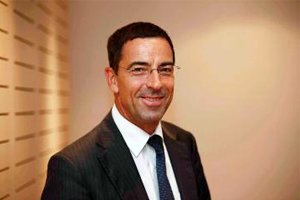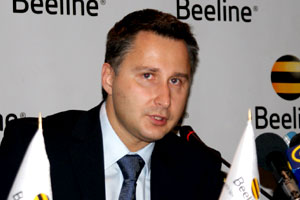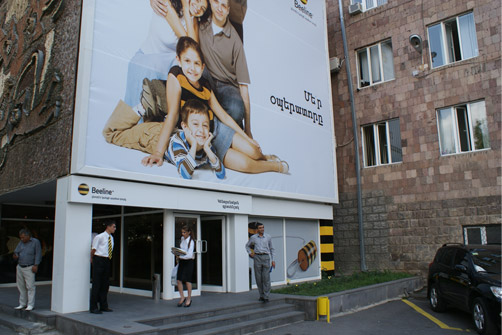-

“Orange/France Telecom Group” Executive Vice President, Chief Corporate Social Responsibility Officer Marc Fossier
14:20 | 14.09.10 | News | 6124
“We build long-term strategy here”
Interview of “Orange/France Telecom Group” Executive Vice President, Chief Corporate Social Responsibility Officer Marc Fossier to Mediamax Agency and iTel.am portal.
-What is the main goal of your visit to Armenia: assessment of Orange Armenia’s corporate social responsibility (CSR) policy or elaboration of its new directions?
-The main goal of my visit is to learn more about Armenia and about Orange Armenia’s achievements, in particular, in the sphere of CSR. My goal is to determine directions, in which the company will need the Group’s support, as well as to get familiar with its experience.
- Can you present the CSR of “Orange/France Telecom Group” both in developed and in developing markets? Which part of the company’s income is directed to CSR?
- The very phrase “corporate social responsibility of a business” seems quite complex, but its essence is simple. CSR is the company’s behavior, the way the company realizes its business activity and receives incomes. We should be responsible in order to secure stable development. A company, which does not hear and does not respond to the expectations of shareholders and customers, cannot secure its stable development.
CSR should be differentiated from charity: being responsible does not mean investing in directions, which are not related to business. Saying responsible business we understand hearing out and meeting the needs and expectations of customers, the society, employees and shareholders. Consequently, it is very difficult to estimate the part of the company’s incomes, which goes to CSR. Responsibility is in the center of our strategy. We try to be the best Telecommunication Company in the world in this sphere and my duties are to put CSR in the center of our decisions.
- Nevertheless, CSR in Armenia is often associated with charity. Does this mean that in our case the borders between those two notions are somewhat blurred?
- Yes, Armenia is not an exception. We deal with charity in the majority of countries of our presence. But our main mission, as a telecommunication operator, is to do what our shareholders and customers want us to do.
- Isn’t the CSR policy of Orange Armenia complicated by the fact that the latter is not a public company in Armenia?
- Despite the fact that Orange Armenia is not quoted on the local exchange, it nevertheless is accountable to the parent company, which, in its turn, is accountable to stock exchanges. And one of my duties is to meet with investors and analysts on CSR and inform them on the work we have carried out in all markets of presence.
CSR essence is to hear out the expectations and needs and try to meet them. Economic and social development of the country is driven by technologies and information access. This is why Orange has focused all its attention in Armenia on increase of internet availability, using the best technologies and trying to secure the best coverage. I highly assess the achievements of Orange Armenia in this sphere, since the company already offers access to broadband internet to 85% of the Armenian population. Moreover, in the majority of remote regions of Armenia, Orange is the only operator, providing access of fast internet, and this is a very responsible position towards the residents of those regions, especially if we take into account the fact that these areas are not considered profitable for the operator. This is a simplest example of what responsibility implies: defining need and meeting it.
- What did you manage to find out during your stay in Armenia? How do you assess CSR policy of Orange Armenia?
- To tell the truth, I am very impressed with the achievements of this young company and its young team. They started with a very high speed and have already made impressive achievements in the sphere of CSR.
The technical team of Orange Armenia elaborated a new design for basic stations, which allows saving territory and power resources. This technology will be implemented in other countries of our presence as well.
The company pays attention to problems of the disabled and elderly people, making them special offers and suggesting special devices.
I am also impressed by the company’s marketing policy: certain players in the telecommunication market often make very complex and abstruse offers, and we, on the contrary, value direct and simple offers for our subscribers. None of our commercial offers implies hidden additional expenses.
Concerning comparison of CSR policy in the countries of our presence, I should state that here as well we have direct and simple priorities, which undergo corrections depending on a particular market.
Our first priority is to secure access to digital world for as many people as possible. In Africa, this means providing telephone connection to as many people as possible, in Armenia – it is internet, in Western Europe we work on implementing most advanced technologies.
Our second priority is to provide for confident and responsible use of our services: we train people on how to use digital technologies. Telecommunications carry certain risks as well: here we speak of safety of personal information, protection of children against harmful information in the net, etc.
The third priority is environmental protection. Here, as an example, I can bring the services of distance business conferences we offer. They allow businessmen significantly reducing the frequency of trips for business meetings. We intent to promote services of business conferences in the Armenian market as well.
- Educational programs for current and potential employees are considered a constituent part of CSR. What are the plans of Orange Armenia in this direction?
- There are employees in Orange Armenia, who have been with us for already one and a half years, and the company cares for their professional career, carries our trainings for them. Of course, we will hold educational programs for students, just as we do that in other markets.
It is very important to remember and to realize that Orange is in Armenia for the long term. We build a long-term strategy here, which is very simple: if the activity of the company contributes to development of the country, its systems of education and culture, and if the relations between operators and subscribers are based on mutual trust and responsibility, long-term prospect for growth opens up for business.

17:29 | 24.09.25 | Articles
Jacopo Losso on Cross-Border Investments and Why Armenia Attracts Angels








